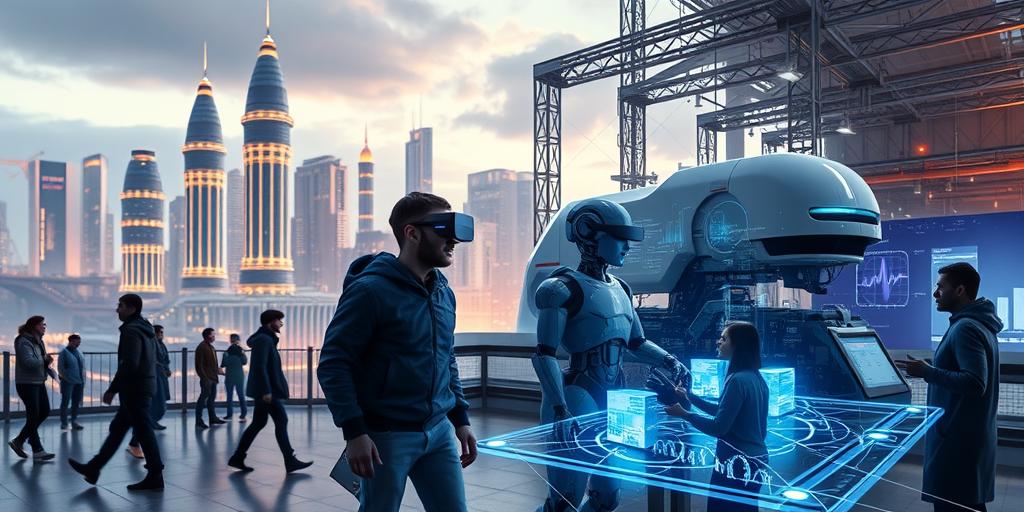Digital transformation is no longer a futuristic concept; it’s a reality shaping businesses and industries across the globe. As we enter a new era, it’s essential to understand the next big trends in digital transformation to stay ahead of the curve and unlock growth opportunities. From the transformative power of artificial intelligence to the interconnectedness of the Internet of Things, these trends are redefining how businesses operate and interact with their customers. Let’s explore these trends and how they’re shaping the future of digital transformation.
The Next Big Trends in Digital Transformation
Artificial Intelligence (AI) and Machine Learning (ML)
AI and ML are revolutionizing digital transformation by automating processes, providing valuable insights, and personalizing customer experiences.
AI-Powered Automation
AI is automating repetitive tasks, freeing up human resources for more strategic work. For example, AI-powered chatbots handle customer inquiries, while intelligent automation streamlines workflows, improving efficiency and productivity.
Predictive Analytics and Insights
AI algorithms can analyze vast datasets to identify patterns and predict future trends. This enables businesses to make data-driven decisions, optimize operations, and anticipate customer needs.
Personalized Customer Experiences
AI personalizes customer interactions, tailoring experiences based on individual preferences and behaviors. This leads to increased customer satisfaction, loyalty, and revenue.
Cloud Computing and Edge Computing
Cloud and edge computing are essential pillars of modern digital transformation, offering scalability, flexibility, and improved data management.
Scalability and Flexibility
Cloud computing provides businesses with on-demand access to resources, enabling them to scale up or down as needed. This agility allows for rapid response to changing market conditions and business needs.
Data Storage and Security
Cloud providers offer robust data storage and security solutions, ensuring data integrity and protection against cyber threats. This is crucial for businesses handling sensitive customer information.
Hybrid Cloud Solutions
Hybrid cloud solutions combine the benefits of public and private clouds, allowing businesses to tailor their infrastructure to specific requirements. This flexibility enhances security, performance, and cost optimization.
Internet of Things (IoT) and Connected Devices
The Internet of Things (IoT) connects physical devices to the internet, creating a network of interconnected systems that collect and share data.
Smart Homes and Cities
IoT devices are transforming homes and cities into intelligent ecosystems, enabling remote control, automation, and improved efficiency. Smart homes offer personalized comfort and security, while smart cities optimize traffic flow, resource management, and public safety.
Industrial Automation and Efficiency
IoT is revolutionizing industrial processes by enabling real-time monitoring, predictive maintenance, and automated control. This leads to improved efficiency, reduced downtime, and enhanced productivity.
Data Collection and Analysis
IoT devices generate vast amounts of data, providing valuable insights for businesses to optimize operations, improve customer experiences, and develop new products and services.
Cybersecurity and Data Privacy
As digital transformation progresses, cybersecurity and data privacy become paramount. Protecting sensitive information and building trust with customers is essential.
Protecting Sensitive Information
Businesses must implement robust cybersecurity measures to protect against data breaches, malware attacks, and other cyber threats. This includes firewalls, intrusion detection systems, and encryption protocols.
Compliance with Regulations
Businesses must comply with evolving data privacy regulations like GDPR and CCPA, ensuring responsible data handling and protecting customer rights.
Building Trust and Transparency
Transparency and accountability are crucial for building trust with customers. Businesses should clearly communicate their data privacy practices and demonstrate their commitment to protecting sensitive information.
Conclusion: Embracing the Future of Digital Transformation
Digital transformation is an ongoing journey, and these trends will continue to shape the future of businesses and industries. By embracing these trends, businesses can unlock growth opportunities, gain a competitive advantage, and create a more connected and efficient world.
Key Takeaways
- AI and ML are transforming business processes, providing valuable insights, and personalizing customer experiences.
- Cloud and edge computing offer scalability, flexibility, and improved data management.
- IoT is connecting physical devices to the internet, creating intelligent systems that collect and share data.
- Cybersecurity and data privacy are paramount for protecting sensitive information and building trust with customers.
Call to Action
To succeed in the digital age, businesses must embrace these trends, develop a comprehensive digital transformation strategy, and invest in the necessary technologies and skills. By doing so, they can navigate the ever-changing landscape of digital transformation and unlock a world of possibilities.




